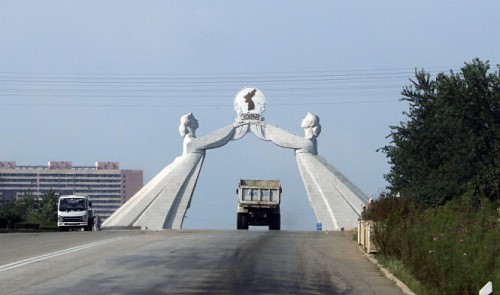Tuoi Tre (Youth) newspaper reporters wrapped up their recent trip to North Korea, impressed by the people’s yearning for their country and its southern half to become a unified whole again.
The 30-year-old tour guide, Choe Un Mi, who is striving to become a member of the Workers' Party of Korea, always made sure her words were in line with the governing Party’s guidelines.
A Vietnamese member of the tour group once said to Choe that North Korea borders three countries, with Russia and China in the north and the Republic of Korea, or South Korea, in the south.
“No, our country forms the frontier with only two neighbors, Russia and China,” she replied.
The Tuoi Tre reporters inquired about Arirang Festival and expressed their excitement at a striking unison performance of more than 10,000 performers in Mayday Stadium, one of the largest in the world, located in Pyongyang, the capital of North Korea.
The Grand Mass Gymnastics and Artistic Performance Arirang, also known as the Arirang Mass Games, or the Arirang Festival, is a mass gymnastic and artistic festival.
They also raised the question as to why the festival had ceased, following news that Kim Jong Un, the nation’s supreme leader, had suspended it since 2012 to avoid budget deficits.
Choe shook her head, putting the suspension down to the repairs going on at the stadium.
She revealed that the Arirang Festival is associated with the tale of the country’s reunification.
Arirang is a famous folklore story of a young married couple.
The husband goes into battle to fight against invaders, leaving his wife behind with his blind mother.
The wife fulfils her filial duty to her mother-in-law and ignores flirtation from a local landlord’s son and stays faithful to her spouse.
When the husband returns home after the war ends, he is enraged at the sight of a rich man flirting with his wife.
His blind mother also confirms his doubts and worst fears.
In a fit of jealousy, the husband walks away, though his wife keeps running after him, shouting “a-ri-rang” (don’t go).
The husband later returns after learning of his wife’s innocence but she has already committed suicide.
The Arirang Festival is organized to highlight the power of unanimity and unity among Koreans, Choe explained.
It is also a warning intended for those who left or are planning to leave North Korea for the South.
“The South [Republic of Korea] thrives on their economic strength, but is dependent on the U.S. Meanwhile, the North is a militarily superior country,” Choe said with a smile after listening to what the journalists shared about the South.
“If the North and South are reunified one day, Korea will grow into one of the world’s mightiest powers,” she concluded.
The last probe
The Tuoi Tre journalists also found their trip to North Korea a once-in-a-lifetime experience, though with several strictly monitored but exhaustive searches of their environment.
Just prior to boarding time, Choe guided the group to a stamp shop near their hotel, adding this would be their last chance to buy souvenirs.
While everyone was buying gifts, Choe asked Thai Loc, one of the Tuoi Tre reporters, to turn on his electronic gadgets for her to check.
Though keen to do the shopping, he agreed to show her what he had in his smartphone, laptop and camera.
Choe closely perused the photos in the gadgets and deleted a number of photos taken of North Koreans.
When they got on the bus and boarded the train later, the woman insisted Loc open his devices again so that she could take a closer look.
Again she took her time scrutinizing the photos and deleted even more photos.
Her last words to the reporter before the train departed were, “You mustn’t take more pictures on the way, or you will have all of them removed.”
As the train screeched to a halt at the station in Sinŭiju, a city in North Korea which faces Dandong, China, across the international border of the Yalu River, everyone seemed nervous, probably as the memory of the rigorous personal search a few days ago was recalled.
However, this final examination exceeded anything they had bargained for.
As one officer asked for passports, the group handed him a stack of passports.
He demanded everyone show their own passport directly to him.
The second officer then demanded exit statements.
Another officer came for the visas. He asked Loc to personally point to and tick in the section for his own information.
They called out the group members’ names and transcribed the names in the Korean language.
Then the fourth officer showed up, saying “camera, iPad, iPhone!” again and again.
The group members showed their cameras, smartphones and tablets one by one.
Another examiner thoroughly rummaged through their luggage and every single item of clothing, including some meant as gifts.
The officer meticulously pressed on the thin T-shirts for any hidden items strapped inside.
The group waited anxiously while another female officer was probing their cameras and smartphones. She took a particularly close look at Loc’s different categories containing thousands of shots.
The woman paid special attention to a photo series of the country’s leaders and the average North Korean by scrutinizing one after another.
Snapshots which featured locals in even the most remotely undesirable perspectives were all deleted.
“They’re afraid of having unattractive photos of their country and residents displayed to the outside world,” a veteran diplomat working for many years in North Korea explained.
Loc’s laptop was also the focus of attention as another male inspector approached his device.
The officers finally got off the train following a tense, stifling probe that lasted almost two hours.
The train rumbled on and reached the Sino-Korean Friendship Bridge, a bridge across the Yalu River on the China–North Korea border, only after a few minutes.
The group all heaved a sigh of relief.
























































